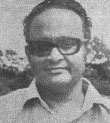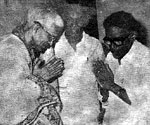| Home | l | K.S. Prakash Rao | l | Randor Guy | l | B Nagi Reddy | l | CTA Krishnaswamy | ||
| K S Rao | l | S V Venkataraman | l | Dr K J Mohan | l | D Yoganand | l | Tatineni Prakash Rao | ||
An indelible mark
- RANDOR GUY
 If
his mentor H.M.Reddy was described as the Grand Old Man of South Indian
Cinema, the disciple L.V.Prasad can be called the Grand Man of Indian
cinema. Prasad who passed away recently made successful films which were
also classics in Telugu, Tamil and Hindi. He built studios in Madras,
Hyderabad and Bombay. He had films processing laboratories in Madras,
Bangalore, Hyderabad, Orissa and also near Delhi. He directed many films
and produced some giving breaks to his assistants and others, who became
star filmmakers in their own right, like Tatineni Prakasha Rao, Adurthi
Subbara Rao, K. pratyagatma . He brought into limelight stars such as
N.T.Rama Rao, S.V.Ranga Rao, "Sowcar" Janaki and Savitri. An
impressive performance by any standards. He was more than a mere filmmaker
who made it big. He was an institution by himself.
If
his mentor H.M.Reddy was described as the Grand Old Man of South Indian
Cinema, the disciple L.V.Prasad can be called the Grand Man of Indian
cinema. Prasad who passed away recently made successful films which were
also classics in Telugu, Tamil and Hindi. He built studios in Madras,
Hyderabad and Bombay. He had films processing laboratories in Madras,
Bangalore, Hyderabad, Orissa and also near Delhi. He directed many films
and produced some giving breaks to his assistants and others, who became
star filmmakers in their own right, like Tatineni Prakasha Rao, Adurthi
Subbara Rao, K. pratyagatma . He brought into limelight stars such as
N.T.Rama Rao, S.V.Ranga Rao, "Sowcar" Janaki and Savitri. An
impressive performance by any standards. He was more than a mere filmmaker
who made it big. He was an institution by himself.
His Telugu films, "Griha Pravesham" (his first as hero and directed in 1946). "Palanati Yuddham" (1947), a slice of stirring Andhra history, which he completed successfully (after Gudavalli Ramabramham who began the film took ill and passed away during its making). "Drohi" (1949), a sensational film which ran into censor problems but became a hit. "Samsaram" (1950), a box-oflice i success, all built up his reputation as a successful filmmaker. His tamil films, though not many were all fine attempts at making good cinema. "Manoham" (1954), Written by Mu.Karunanidhi, featuring top performers like Sivaji Ganesan, P. Kannanamba and T.R.Rajakumari not only became a hit but also a cult film remembered even to this day for its scintillating dialogues and fine performance by Sivaji Ganesan and others..
"Missiamma" (1955) was a fine comedy of manners,
a mild satire. His array of satirical comedies in Tamil and Telugu, for
the Vijaya ''twins'' B.Nagi Reddi-Chakrapani, like "Kalyanam Panni
Paar" and his Hindi films, "Sharada'", "Bidaii",
and other productions were all highly successful. So were "Sasural"
(T.Prakash Rao), "Millan" (Adurthi Subba Rao), and "Ek
Duje Ke liye" (K.Balachander). What a spectacular record for a moviemaker!
That was L.V.Prasad.
W'hen talkies began to be made in india in 1931, Prasad had the rare and unique distinction of appearing in the first talkies made in 1931 in Hindi ("Alam Ara") , Tamil ("Kalidas'), and Telugu ("Bhaktha Prahalada"), He drew a salary Rs. 35 per month and his duties included everything that human hands could do in a studio carrying equipment, moving furniture and props in a set, and being generally useful to the director in his work. When H.M.Reddi came down to Madras to make films, he sent for Prasad in early 1940's and the disciple appeared in a couple of films. But he went back to Bombay and returned thanks to the call of the actor, and director -producer K.S.Prakasha Rao who got him "Griha Pravesham" . He was also the producer and hero of "Drohi", and then there was no looking back for Prasad. A film for Krishnaveni, "Mana Desam" (1948) which introduced N.T.Rama Rao to films in a minor role as police officer also created impact. And that minor classic "Sahukaru" for Nagi Reddi- Chakrapani, a tale of typical rural life in Andhra, written by Chakrapani, marked Prasad as a maker of significient films.
Even his comedies for the Vijaya "twins" were satires with an underlying message for social betterment . Prasad believed in entertainment but it had to be purposeful, meaningful and not mere fizz.And he succeeded in his objectives.
Prasad was a tough man and settled for nothing but the best from his artistes. He realised like Samuel Glodwyn, that all smiles on a set often meant a lousy movie!"
- Courtesy THE HINDU
 |
CTA Ramnoth Award was presented to Shri L V Prasad in the year 1982. Shri Prasad had been affectionately greeted by Hon'ble Thiru R.M. Veerappan while Hon'ble Thiru K. Rajaram admires happily |